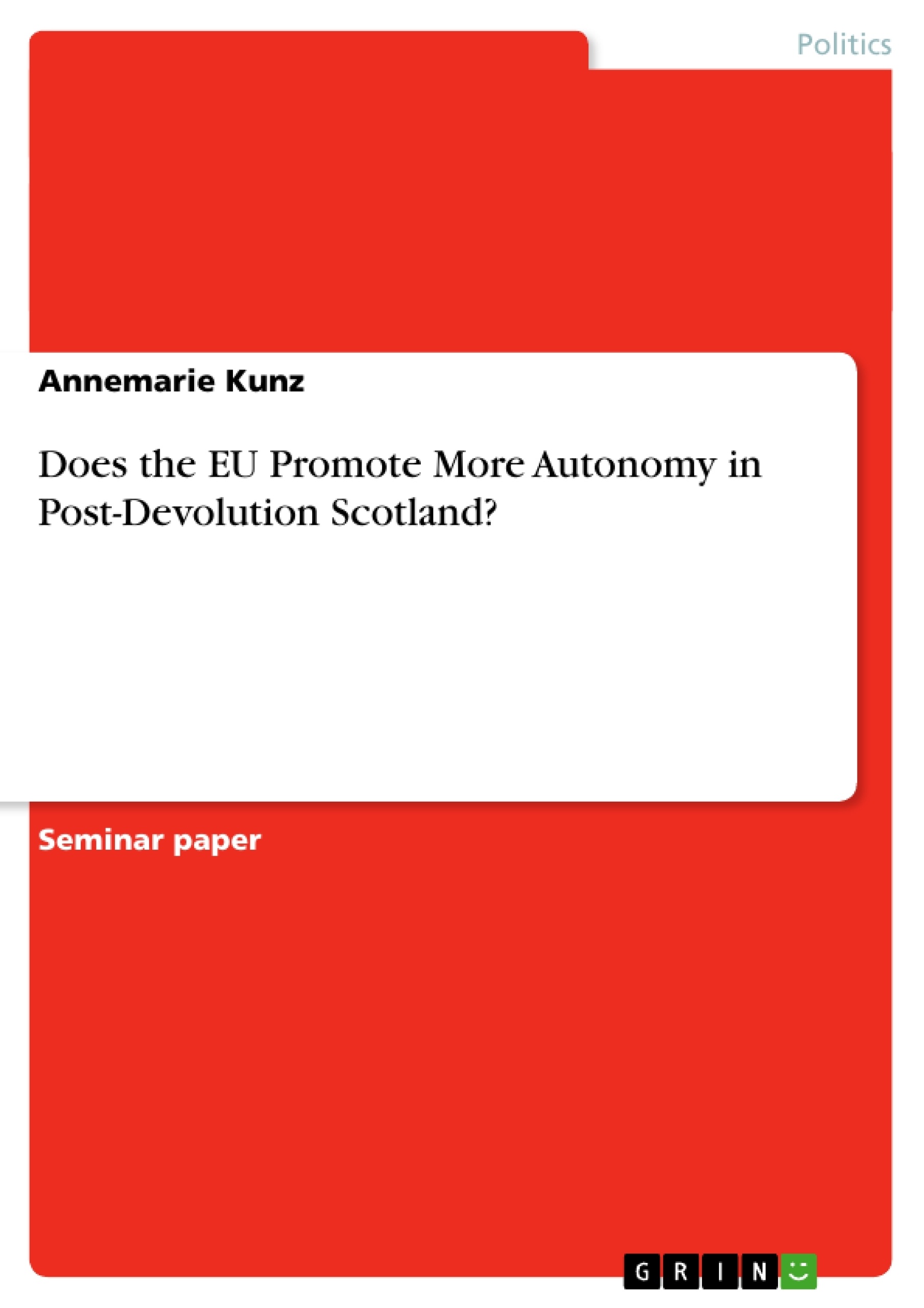Excerpt
Table of Contents
1. Introduction
2. Scottish Devolution
3. Scotland in Europe
4. European Regional Policy 2007-2013
5. Motivation for More Autonomy
5.1 Scottish History
5.2 Domestic Politics
5.3 EU Regional Policy
5.4 The European Union Itself
6. Conclusion
Bibliography
1. Introduction
Scotland is a region in Western Europe with a strong identity and a long tradition of a regional autonomy movement. Since Scotland got its own government in 1999, which is still very dependent on the UK central government, and as the Scottish National Party (SNP) is currently the majority party in this government, independence became an important issue in Scottish politics. The SNP is committed to full constitutional independence of Scotland within the European Union. After 300 years of union, the Scottish are allowed to hold a referendum on their independence in 2014. However, only a third of the population is in favour of this.
This paper starts with an explanation of the development of the Scottish independence movement, analyses devolution and the Scottish executive’s ways of influencing European politics. It then goes on to examine EU regional policy 2007-2013 and assesses the impact of various factors influencing the demand for more autonomy.
I will come to the conclusion that domestic politics are as important, if not even more so, than the European Union, to increase demands for more autonomy. However, because of a lack of public support, it is unlikely that Scotland becomes independent. In contrast, increased autonomy towards the UK central government is certain to develop over time.
2. Scottish Devolution
Long ago, from its foundation in the Middle Ages in 843AD, Scotland used to be an individual country. In 1603, the Union of Crowns took place, as James the 6th of Scotland succeeded the English, Scottish and Irish thrones. With the Act of Union in 1707, when the Scottish and English Parliaments merged, the Kingdom of Great Britain was created. The cause for Scottish home rule dates back to then. The United Kingdom as we know it today consists of England, Wales, Scotland and Northern Ireland.[1]
UK regional policy started during the economic depression in the 1930s, when Assisted Areas were set up for companies. In the 1980s under Thatcher, the policy was reduced again, but was reanimated under the constitutional modernization by the New Labour government in 1997. Therefore, Scotland received its own parliament under the Scotland Act in 1998. It established devolution of power from the UK’s central government under special circumstances.[2]
The devolved administration gained electoral legitimacy and primary legislative powers; and new arrangements for EU policy-making in the UK were set up. Some people perceive devolution as a measure to attune the UK to the EU, since sub-national authorities in the UK were involved in EU policy before devolution.[3]
The directly elected assembly in Scotland, the Scottish Executive, enjoys executive and legislative devolution and became thus involved in new aspects of policy participation and legislation that did not feature its role in administrative decentralisation pre-devolution. It developed more self-confidence and institutional integrity despite a UK-wide unified civil service. The key document on devolution, the Memorandum of Understanding, lays down general principles for interadministration policy coordination and cooperation in “areas where it is necessary to ensure uniform arrangements between the UK Government and the three devolved administrations.”[4]
However, Scotland has to follow the central government’s line in UK politics, as the latter can always dissolve the Scottish parliament. It pursues a non-conflictual approach to interadministration relations and has to imply two key principles. Firstly, there is the principle of no surprises, which demands confidentiality of the devolved assembly concerning central government information. Secondly, business based on sharing information and involvement has to rely on established Whitehall ways.[5]
3. Scotland in Europe
EU policies and legislation will have a considerable effect on many of the matters for which the Scottish Parliament will be responsible. The UK Government wishes to involve the Scottish Executive as directly and as fully as possible in the Government’s decision making on EU matters. It is part of the Government’s intention that Scottish Executive Ministers and officials should be fully involved in discussions within the UK Government about the formulation of the UK’s policy position on all issues which touch on devolved matters.[6]
[...]
[1] Black 2012
[2] Burch et al 2005, p. 467-468
[3] Bulmer et al 2006, p. 75-76
[4] Bulmer et al 2006, p. 79-81
[5] Bulmer et al 2006, p. 80
[6] Jeffery 2004, p. 611
- Quote paper
- Annemarie Kunz (Author), 2012, Does the EU Promote More Autonomy in Post-Devolution Scotland?, Munich, GRIN Verlag, https://www.grin.com/document/270999
Publish now - it's free






















Comments